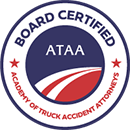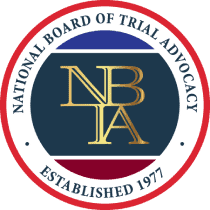State and Federal Trucking Regulations
Nationwide, the trucking industry is regulated by the Federal Motor Carrier Safety Administration (FMCSA). As part of the Department of Transportation (DOT), the FMCSA has broad regulatory authority over motor carriers, truck drivers, licensing agencies, freight forwarders, and other entities.
Rules regarding the transportation, movement, and delivery of goods do not just come from the federal level, though. States also have the authority to regulate tractor-trailers, companies, and drivers that operate within their state lines.
While it would be impossible to cover every last regulation set forth by the FMCSA or in the states in which Trucking Injury Law Group practices, what we can do is touch on the most important or most commonly violated regulations that contribute to truck accidents. Here is a closer look at federal trucking regulations, as well as state-specific regulations for Nevada, Washington, Oregon, and Idaho.
Federal Trucking Regulations
FMCSA regulations play a critical role in the overall safety of our roads. Below are some regulations established and enforced by this agency that you should be aware of.
Hours-of-Service Rules
Perhaps one of the most important is the federal hours-of-service regulation. HOS regulations are intended to prevent the presence of sleepy, drowsy, or fatigued truck drivers on our interstates and roads. Current HOS regulations require that a trucker:
- Drive no more than 11 hours in a single shift, and only after observing 10 consecutive hours off duty.
- Refrain from driving following the 14th consecutive on-duty hour.
- Take a mandatory 30-minute break following 8 cumulative hours of driving.
- Drive no more than 60 hours in a seven-day period, or 70 hours in an eight-day period.
Exceptions to the above HOS regulations include provisions for short hauls and adverse driving conditions. These exceptions allow drivers to legally exceed limitations on driving time without incurring any penalties.
Drug Testing Rules for Truck Drivers
As a condition of employment, truck drivers must undergo pre-employment drug testing. A negative test or a negative result for another controlled substance test meeting the same requirements within the past 30 days is acceptable.
A truck driver must undergo mandatory drug testing if involved in an accident resulting in:
- Serious bodily injury for which they also received a citation,
- Disabling damage to another vehicle for which they also received a citation, or
- A person’s death, regardless of whether they also received a citation.
Truck drivers may also be randomly tested for illicit substances or whenever there is a reasonable suspicion to do so. Drivers who have failed past drug tests must also undergo return-to-duty and follow-up tests.
Additional Federal Trucking Regulations
FMCSA regulations impact every facet of the interstate trucking industry. This includes oversight regarding:
- Size, weight, and height of commercial motor vehicles (CMVs)
- Noise emission standards
- Routing
- Operational authority
- The transportation of hazardous materials
- Record preservation
- Data recording and collection
- Special training
- Waivers and exemptions
- Alcohol use
- State compliance with the commercial driver’s license (CDL) program
- Safety and fitness procedures
- Qualifications for drivers of longer combination vehicles (LCVs)
- Maintenance, inspection, and repair procedures
- Pre- and post-trip inspections
- Parking rules
- And much more
Driver error is one of the biggest contributors to accidents between CMVs and smaller passenger vehicles, but it is far from the only cause. Any time that we take on a case, we conduct an in-depth investigation to determine whether any regulatory violations may have also played a role in the collision.
Trucking Regulations in Nevada
The Nevada Department of Transportation (NDOT) and the Nevada Transportation Authority (NTA) both have far-reaching authority over the regulation of trucking operations within the state of Nevada.
State regulations of note include:
- Restrictions on the size, weight, length, and width of CMVs, including permits for over dimension vehicles (ODVs).
- Route restrictions, including those that prohibit CMVs weighing more than 26,000 pounds from traveling westbound on parts of Mt. Rose Highway.
- A maximum speed limit of 75 miles per hour (mph) for CMVs.
- Minimum liability insurance requirements for motor carriers.
A more in-depth look at state-specific regulations is available on our website.
Trucking Regulations in Washington
Multiple regulatory bodies oversee interstate and intrastate trucking in Washington state, including the Washington Department of Transportation (WSDOT) and the Washington Department of Licensing (DOL).
Some of the most important regulations to take note of within this state include:
- A maximum speed limit of 60 mph for tractor-trailers and large trucks exceeding 10,000 pounds.
- Lane restrictions for I-5, I-90, and I-405.
- Left lane and HOV lane restrictions for CMVs that exceed 10,000 pounds.
- Seasonal tire chain requirements.
For additional information regarding regulations specific to Washington state, please visit this page.
Trucking Regulations in Oregon
Like most other states, there are multiple agencies that oversee the creation, implementation, and enforcement of regulations for motor carriers in the state of Oregon. These include the Commerce and Compliance Division and the Motor Carrier Transportation Division, both of which are subsets of the Oregon Department of Transportation (ODOT).
Key takeaways from regulations from the Beaver State include:
- Who may be certified as a commercial vehicle inspector.
- The application of Oregon Commercial Vehicle Inspection Decals.
- Requirements for odometers that record cumulative mileage accurately.
- Requirements for all drivers to carry tire chains and when to use them.
To read more about these and other regulations for the state of Oregon, click here.
Trucking Regulations in Idaho
The Idaho Transportation Department (ITD) is one of the agencies with the authority to set rules and regulations for motor carriers and truck drivers that operate in Idaho. Examples of state-specific regulations include:
- CDL testing and certification.
- Limitations on the transportation of hazardous materials and waste.
- Limitations on CMV size, weight, length, and width.
- Financial liability and insurance coverage requirements for motor carriers.
More information about regulations specific to the state of Idaho can be found here.
Trucking Companies Know How To Hide Their Tracks
Motor carriers know that there are consequences for violating state and federal trucking regulations. Unfortunately, this doesn’t necessarily stop them from violating these regulations—it simply makes them better at covering their tracks.
If you’ve been injured in a trucking accident, you need a qualified team of experienced attorneys to investigate your case. At Trucking Injury Law Group, our Super Team of lawyers has the knowledge necessary to uncover any evidence of regulatory violations that may have contributed to or caused an accident.
Let us put our experience to work for you. We’ll meet with you in a completely free, no-obligation setting to discuss your legal rights after an accident.






